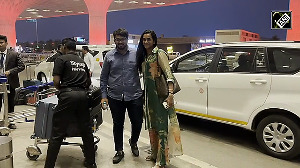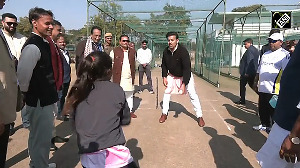Words flit around the world in these days of Web-enabled war. Lots of words. The ones that really struck me came from John Le Carre, him of Tinker, Tailor, Soldier, Spy, The Russia House and a shelf full of other finely-crafted books. From his interviews and writings, you know this is not someone given to off-the-cuff statements. This is an intelligent man who thinks deeply about the world around him, about the great issues of his time, about relationships between people, between nations. So for a man like this to say what he did in mid-January is a sign of the times we live in. A commentary on the events that we watch happening around us, assuming we are helpless.
"America has entered one of its periods of historical madness," he wrote in the London Times on January 15, "but this is the worst I can remember: worse than McCarthyism, worse than the Bay of Pigs and in the long term potentially more disastrous than the Vietnam War." He refers, of course, to the Bush Company's headlong drive to push their nation -- the world? -- into war in Iraq.
Le Carre touches on a number of issues, but for me the most telling is in these sentences: "How Bush and his junta succeeded in deflecting America's anger from bin Laden to Saddam Hussein is one of the great public relations conjuring tricks of history. But they swung it."
And in fact, the sleight of hand is in more than just the deflection from Osama to Saddam. It's also in the effective end to argument over financial scams such as WorldCom and Enron; over American withdrawal from international treaties and commitments; and maybe above all, over whether Bush actually won the 2000 Presidential election to begin with.
Perhaps understandably, September 11 put those issues in the shade. But today's drumbeat of war has probably killed them for good. (Think about it: don't such terms as the Florida recount and -- what was it, chads? -- seem like ancient, musty history today?)
Yet you only need a little more thought to know that this business of deflecting anger, deflecting attention, is the bedrock of politics. More, that war is a time-tested method to achieve it. Dubya Bush is hardly the first to do it, nor is he the only one at it today, nor will he be the last.
Therefore, the question to ask -- at least, by anyone who thinks asking questions remains a worthwhile thing to do -- is whether this war, or any war, is justified at all in the first place. Dubya says it is, but I'm interested in answers from people with less of a stake in the next US election.
In truth, that question to ask plays itself out into others, and they pile up fast. Where's the firm evidence in Iraq that justifies war? What is the connection between Saddam and Osama, especially given that they appear to hate each other? Where is Osama anyway, and what's being done to find and punish him for September 11? How much of this war-mongering has to do with oil? How much with US Presidential elections next year? Why should we be either with Dubya or with terrorists, as he infamously told us we had to be? Why can't I be every bit as repelled by the prospect of war on Iraq -- even despot-ruled Iraq -- as I was by the sight of airliners smashing into the WTC?
And if it's war and terrorism, there are questions to ask of other political leaders too. Whether they are named Blair or Musharraf, Sharon or Saddam, Arafat or Vajpayee.
Take that last named honourable. Take India.
When prime and home and chief ministers tell us that terrorism is absolutely the greatest threat to India, that terrorism comes only from across our western border, that that western neighbour is led by and filled with glowering monsters and that we will not negotiate with them until the terrorism stops: well, it seems to me the questions to be asked simply bubble over. Try some, won't you?
First, without in any way diminishing the horror of terrorism, could we know precisely how it is a greater threat to India -- meaning the lives of Indians -- than, say, the poverty that keeps hundreds of millions of my fellow countrymen scrounging for food and water every day? I mean "precisely": somebody's empty mantra about how a nation has to first bother about security interest me not at all. Because that mantra is used to cover for not bothering about anything, security least of all.
Second, without in any way lessening the guilt of the western neighbour, could we know what we must make of such home-grown terror as the massacre of 3000 Indians in Delhi in 1984? 1000 more in Bombay, 1992? 1000 more in Gujarat, 2002? Five more in Jhajjar, 2002? A dozen more in Bihar last week?
Dozens and hundreds more incidents like these? And all these instances of terrorism are in addition to the daily terror I alluded to above: the sheer misery that destroys so many Indian lives. What are my leaders, intent as they claim to be on fighting terrorism, doing about these issues?
Third, with their constant mouthings on terrorism, are our leaders not simply deflecting our anger over the multiple Indian problems they have no intention of addressing -- from poverty to home-grown massacres to putting criminals in power?
Fourth, are we not allowed to be as angered by terrorism from within our borders as by terrorism from across them? Fifth, then why do our leaders pronounce that their critics are, by definition, pro-terrorism, unless it is to evade the criticism? Sixth, what on earth does a temple have to do with any of this, unless it is for further evasion? Seventh, do you really want me to go on?
What the war talk, the enemy talk, the terrorism talk, does is silence exactly such questions, whether in the US, Pakistan or India. Yet paradoxically, what it must do is make the questions louder than ever. It is in the middle of our leaders' hostile invective towards an enemy that we must be most sceptical, most insistent on clear answers. Because history makes it a good bet that such rhetoric amounts only to what Le Carre remarked on: clever deflection of anger.
And if that's what Le Carre said, circa 2003, here's how an earlier, but just as fine, writer put it a century and a half earlier. It's long, but bears reading in full. This is Mark Twain:
"The loud little handful -- as usual -- will shout for the war. The
pulpit will -- warily and cautiously -- object... at first. The great,
big, dull bulk of the nation will rub its sleepy eyes and try to make
out why there should be a war, and will say, earnestly and indignantly,
'It is unjust and dishonorable, and there is no necessity for it.' Then
the handful will shout louder. A few fair men on the other side will
argue and reason against the war with speech and pen, and at first will
have a hearing and be applauded, but it will not last long; those
others will outshout them, and presently the antiwar audiences will
thin out and lose popularity. Before long, you will see this curious
thing: the speakers stoned from the platform, and free speech strangled
by hordes of furious men... Next the statesmen will invent cheap lies,
putting the blame upon the nation that is attacked, and every man will
be glad of those conscience-soothing falsities, and will diligently
study them, and refuse to examine any refutations of them; and thus he
will by and by convince himself that the war is just, and will thank
God for the better sleep he enjoys after this process of grotesque
self-deception."
Notice that even 150 years ago, Twain comments that people "refuse to examine" the lies. Still, I know he wouldn't mind being proved wrong today. You can start with you: put that loud little handful in the corner where they belong.






 © 2025 Rediff.com -
© 2025 Rediff.com -